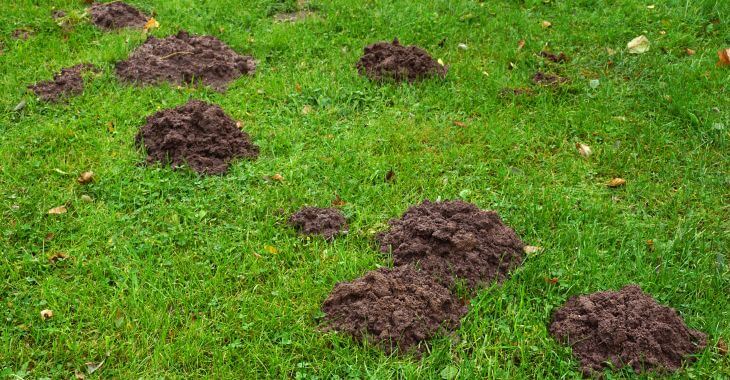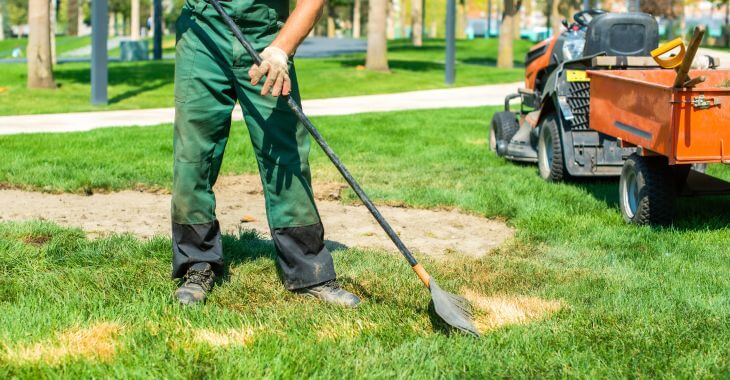What Causes Small Holes in Lawn Overnight?

The sudden appearance of small holes in lawn overnight can be puzzling and concerning for homeowners. These holes are often attributed to a few different factors and creatures that are active during the nighttime. Here are some of the possibilities of what causes small round holes in lawn.
Holes in My Yard with No Mounds
There are many creatures that can burrow into the soil and leave holes in your lawn with mounds of displaced dirt. These include insects, birds and rodents. But if you have holes in your yard with no mounds, it is likely not one of those animals and may be one of the following:
Nightcrawlers and Earthworms
Nightcrawlers, a type of large earthworm, are well-known for their nocturnal activities. They come to the surface at night to feed on decaying organic matter and leaf litter. In the process, they can create small holes in lawn overnight as they burrow and deposit castings of soil.
These holes are usually harmless and can actually improve soil aeration and drainage, benefiting your lawn in the long run.
Fungal Activity
In some cases, fungal activity beneath the surface of the lawn can lead to the development of small depressions or holes in the grass. Fungal diseases can weaken the grass roots and cause localized areas to sink, creating small pits or holes in the lawn.
Insects
Certain insects, such as ground-dwelling wasps and beetles, can also be responsible for creating small holes in your lawn. These insects may dig holes to create nests or to lay their eggs. In some cases, their burrowing activity can result in multiple small holes scattered across the lawn.
Fallen Debris or Plant Roots
Sometimes, the holes in your lawn may be caused by the decomposition of buried debris or plant roots. As organic matter breaks down, it can create gaps in the soil, resulting in small holes appearing on the lawn’s surface.
Small Holes in Lawn Overnight with Mounds
Occasionally, animals may be responsible for small holes in the lawn. They dig these holes in search of food or to establish burrows. While these holes are usually relatively small, they can become more numerous if the animal is frequenting your yard. Possible animals causing holes in your yard include:
Moles
Moles are subterranean creatures that tunnel through the soil in search of insects, grubs, and earthworms, which make up the bulk of their diet. Their tunneling activity can lead to raised, volcano-shaped mounds of soil and small holes in your lawn.
While these holes are typically not very large, moles can be problematic if they create extensive tunnel systems, causing damage to plant roots and the lawn’s structural integrity.
Voles
Voles, also known as meadow mice, are small rodents that can dig small holes in your lawn while searching for food. They feed on plant roots, grasses, and seeds, and their tunneling activity can be mistaken for that of moles. Vole holes are typically smaller and shallower, and they may leave behind an intricate network of surface runways through the grass.
Birds
Some species of birds, particularly blackbirds, starlings, and robins, are known to search for earthworms and insects in lawns by probing the ground with their beaks. This can create small holes, often accompanied by small piles of displaced soil.
Ants and Other Insects
Ants and other insects may create small holes in your lawn as they excavate underground nests. Ants, in particular, are known to create small mounds of soil around their nest entrances. These holes are often not very deep but can be numerous, especially in areas with heavy ant activity.
It’s important to note that the size and shape of the holes can offer clues about the likely culprit. For example, nightcrawler holes are usually round and surrounded by small piles of soil, while molehills are often volcano-shaped. Vole runways can be identified by shallow troughs in the grass.
How to Address Small Holes in Your Lawn
To address the issue of small holes in your lawn, you may consider the following steps:
1. Identify the Cause
Before taking any action, try to identify the cause of the holes. This will help you determine whether any intervention is necessary and, if so, what approach to take.
2. Minimize Attraction
If your lawn is attracting certain pests or animals, such as moles or voles, consider taking steps to minimize their attraction. This may involve controlling insect populations, securing trash containers, or reducing excessive thatch in your lawn.
3. Install Barriers
To prevent burrowing animals or rodents from causing further damage, you can install barriers such as mesh or fencing. These can deter animals from digging in your lawn.
4. Trapping or Repelling
For pests like moles or voles, trapping or repelling methods can be effective. Live traps, sonic repellent devices, or baits can be used to control their populations. It’s often advisable to consult with a pest control professional for the most appropriate and humane methods.
5. Lawn Maintenance
Proper lawn maintenance practices, such as regular mowing, watering, and fertilization, can help maintain the health of your grass and make your lawn less appealing to some pests.
6. Consult with a Professional
If you’re unsure about the cause of the holes or how to address the issue, consider consulting with a professional landscaper or pest control expert. They can help assess the situation and provide appropriate guidance and solutions.

Most small holes in your lawn that appear overnight are a common and benign occurrence caused by nightcrawlers, birds, or insects. However, if you suspect that a specific pest or animal is causing significant damage to your lawn, you should consult a landscaper for professional assistance.


